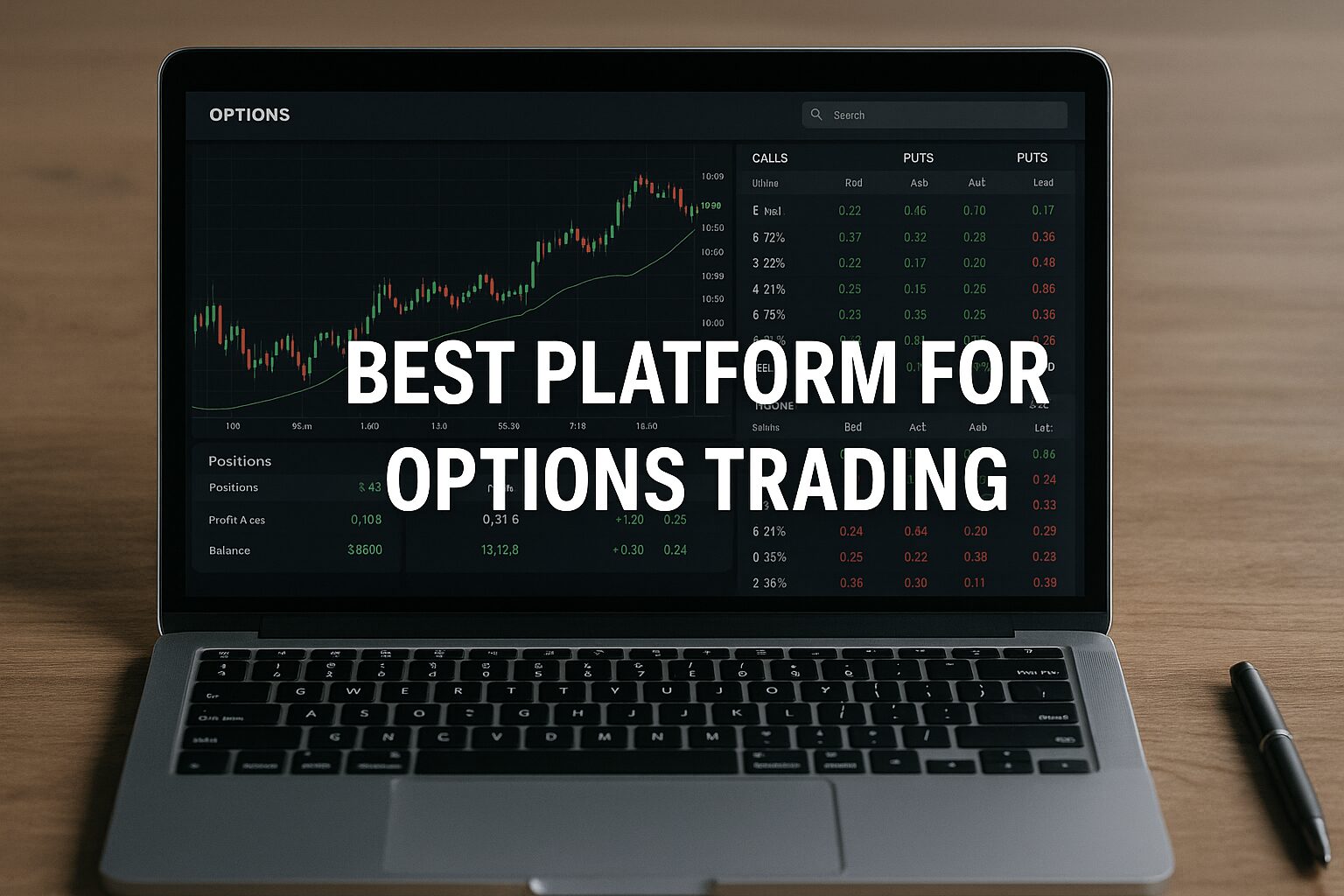Options trading can be a smart way to grow your money if you know how to use it. But to trade safely and easily, you need the right platform. Some platforms are made for beginners, while others offer strong tools for expert traders. Choosing the best one can save your time, lower your costs, and help you make better trades. At Trading Pulse we’ll guide you through the best platforms to trade options easily and safely.
What is Option Trading?
Options trading means buying or selling contracts that allow you to choose whether to trade a stock at a specific price within a set time period. You don’t need to own the stock to trade options. People use them to make profits, reduce risk, or invest with less money.
Types of Option Trading
There are two main types of options in trading. Each type helps traders make money based on whether they think prices will go up or down.
- Call Option
- Put Option
Call Option
If you have a call option, you can buy a stock at a fixed price before the option expires. Traders use call options when they expect the stock price to rise. It lets you control shares without paying the full amount upfront.
Put Option
If you have a put option, you can sell a stock at a fixed price before the option expires. Put options are used when you think the stock price will fall. They help protect your investment or earn a profit in a falling market.
In Short:
Call Option = You buy if you think the stock price will go up.
Put Option = You sell if you believe the stock price will go down.
Why Is Choosing the Right Platform Important?
Choosing the right platform for options trading makes your experience easier, safer, and more successful.
- A user-friendly design helps you trade without confusion.
- Built-in tools let you plan and analyze trades better.
- Low fees save you money on every trade.
- Fast order execution increases your chances of making a profit.
- Strong security keeps your money and personal data safe.
Best Platforms for Options Trading (with Pros & Cons)
There are many platforms available for options trading, but choosing the right one can make a big difference. Below are some of the best trading platforms, each with their own pros and cons.
- Robinhood
- Webull
- TD Ameritrade (thinkorswim)
- E*TRADE
- Interactive Brokers (IBKR)
- Fidelity
- Charles Schwab
Robinhood
Robinhood is a beginner-friendly platform that makes options trading simple. It has a clean mobile app and offers commission-free trades. However, it lacks advanced tools, which may not suit experienced traders.
Pros of Robinhood
- No commission fees on options trades.
- Easy-to-use app for beginners
- Quick account setup with no minimum deposit.
- Real-time market data is available for free.
- Clean and simple design for stress-free trading.
Cons of Robinhood
- Limited trading tools for advanced users.
- No paper trading feature for practice.
- Basic research and charting options.
- Customer support can be slow.
- Not ideal for complex trading strategies.
Webull
Webull is a user-friendly trading platform that’s great for beginners and mobile users. It offers commission-free options trading and useful charting tools. However, it may still feel a bit basic for expert-level strategies.
Pros of Webull
- Zero commission fees on options trades.
- Modern, easy-to-use mobile app.
- Good charting tools for basic to mid-level analysis.
- Extended trading hours (pre-market and after-hours).
- Paper trading feature to practice without real money.
Cons of Webull
- Limited educational content for beginners.
- No live customer support by phone.
- Fewer advanced tools compared to pro platforms.
- Options trading approval takes time.
- No support for mutual funds or bonds.
TD Ameritrade (thinkorswim)
Thinkorswim by TD Ameritrade is a great choice for skilled traders who want powerful tools and detailed market analysis. It offers powerful charts, strategy testing, and a wide range of trading features.
Pros of TD Ameritrade (thinkorswim)
- Powerful charting and analysis tools.
- No commission on options trades (just $0.65 per contract).
- Customizable trading layout for better control.
- Access to paper trading for practice.
- Strong educational resources and webinars.
Cons of TD Ameritrade (thinkorswim)
- Complex interface may overwhelm beginners.
- Takes time to learn all features.
- Mobile app is heavy and may lag on old devices.
- $0.65 per options contract fee applies.
- Too many tools can feel confusing for casual traders.
Need help comparing tools?
Trading Pulse offers simple reviews to make your decision easier.
E*TRADE
E*TRADE is a well-balanced platform that suits both beginners and experienced traders. It offers a smooth trading experience with helpful tools and educational support. The platform is easy to navigate and provides solid options trading features.
Pros of E*TRADE
- User-friendly platform with easy navigation.
- Strong educational content for beginners.
- Two trading platforms to match different skill levels.
- Commission-free options trading (only $0.65 per contract).
- Reliable customer support via phone and chat.
Cons of E*TRADE
- $0.65 per options contract fee still applies.
- Advanced tools may require a learning curve.
- No cryptocurrency trading available.
- Mobile app is less advanced than desktop version.
- Minimum balance required for some accounts.
Interactive Brokers (IBKR)
Interactive Brokers (IBKR) is a top choice for active and global traders who want low fees and advanced tools. It offers powerful features and access to international markets, but may feel complex for beginners.
Pros of Interactive Brokers
- Very low fees and competitive options contract rates.
- Access to global markets in many countries.
- Advanced trading tools for professionals.
- Fast trade execution with smart routing.
- Supports multiple asset types beyond just options.
Cons of Interactive Brokers
- Platform is complex and not beginner-friendly.
- Learning curve for using advanced tools.
- Mobile app can feel overwhelming for new users.
- Some features may require a minimum balance.
- Customer support may be slow at busy times.
Fidelity
Fidelity is a trusted platform known for its strong customer service and research tools. It offers low-cost options trading and is a good choice for both beginners and long-term investors.
Pros of Fidelity
- Trusted and well-established brokerage firm.
- Strong customer support with live help.
- Great research tools and educational content.
- No account minimums required to start.
- Low-cost options trading with $0 commission and $0.65 per contract.
Cons of Fidelity
- Platform may feel basic for active or pro traders.
- Limited advanced charting tools.
- No paper trading feature for practice.
- Mobile app is not ideal for fast-paced trading.
- Options tools are less advanced than competitors like thinkorswim.
Charles Schwab
Charles Schwab is a reliable platform with strong research tools and excellent customer service. It’s great for beginners and long-term investors looking for a stable and easy-to-use trading experience.
Pros of Charles Schwab
- Strong customer support with 24/7 help.
- Good research and educational tools.
- No account minimums to start trading.
- User-friendly platform for beginners.
- Commission-free options trading (only $0.65 per contract).
Cons of Charles Schwab
- Advanced tools are limited for active traders.
- No paper trading feature for practice.
- Mobile app is basic compared to some competitors.
- Options tools not as powerful as thinkorswim or IBKR.
- $0.65 per options contract fee still applies.
How to Choose the Right Platform for You?
Choosing the right platform depends on your goals, experience, and how you like to trade. Ask yourself these simple questions — and check the tips to help you decide.
Are you a beginner or an expert?
👉 Beginners may like Robinhood or Webull for their simple design.
👉 Experts may prefer thinkorswim or IBKR for advanced tools.
Do you want more tools or a simple design?
👉 For easy navigation, go with Robinhood.
👉 For more features and in-depth analysis, thinkorswim is better.
Will you use mobile or desktop more?
👉 Webull and Robinhood work well on mobile.
👉 E*TRADE and Fidelity are great on desktop.
Do you want to test trades without risk?
👉 Choose a platform that offers paper trading, like Webull or thinkorswim.
👉 It’s a great way to practice before using real money. ?
\][\[
Tip: Start small, test the platform, and switch later if needed.
Final Thoughts
Choosing the best platform for options trading doesn’t have to be hard. Focus on what matters most to you—whether it’s ease of use, powerful tools, or low fees. Start with a platform that matches your skill level, and don’t rush. The more you practice and explore, the better you’ll get. You can always find helpful tips and reviews at Trading Pulse to support your trading journey.
Frequently Asked Questions
What is the best platform for trading?
The best platform depends on your needs. For beginners, Robinhood and Webull are great. Advanced traders may prefer TD Ameritrade or Interactive Brokers.
What is the best platform for stock trading?
Fidelity and Charles Schwab are trusted platforms for stock trading. They offer strong research tools and no commission fees. Both are great for long-term investors.
Which platform is best for options trading?
TD Ameritrade (thinkorswim) is great for advanced options trading. Robinhood and Webull are better for beginners. Choose based on your skill level and goals.
Is there a platform for options trading with zero brokerage?
Yes, Robinhood and Webull offer commission-free options trading. They are beginner-friendly with no hidden fees. However, they offer limited advanced tools.



































